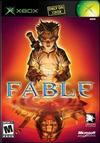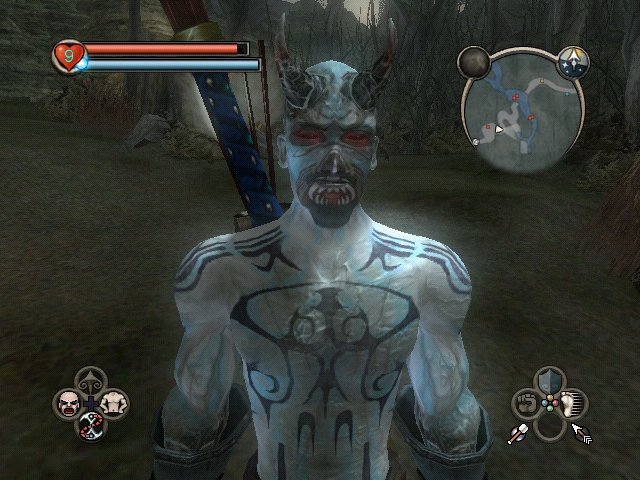


 You begin Fable as a young child, and it's
here that you're introduced to the game's moral alignment
system, its sense of humor, and its dark edge--as well as its
basic controls, which will be mostly intuitive if you've
played other third-person-perspective games recently. Your
first order of business is to earn a few gold pieces with
which to purchase a birthday gift for your sister. Whether
you make the money by being helpful or by making lots of
trouble is up to you. This initial
choose-your-own-adventure-style sequence is quite impressive
in the amount of freedom and variety it affords you, and it
suggests that Fable will constantly challenge you to make
moral decisions like the ones presented early on. For
example, will you help a little kid fend off a bully, or will
you join in on the bullying (or beat them both up)?
These decisions are so ethically basic that they're not at
all difficult to make, but it's still interesting to see how
the game plays out depending on what you do. You'll discover,
though, that Fable's introduction is not reflective of most
of the game's quests, which don't give you many choices. At
any rate, soon after you complete your first main task,
something sinister happens. Fortunately for your young
character, he is saved by an enigmatic man who transports him
to the Heroes' Guild, where he is to be trained to become an
adventurer.
You begin Fable as a young child, and it's
here that you're introduced to the game's moral alignment
system, its sense of humor, and its dark edge--as well as its
basic controls, which will be mostly intuitive if you've
played other third-person-perspective games recently. Your
first order of business is to earn a few gold pieces with
which to purchase a birthday gift for your sister. Whether
you make the money by being helpful or by making lots of
trouble is up to you. This initial
choose-your-own-adventure-style sequence is quite impressive
in the amount of freedom and variety it affords you, and it
suggests that Fable will constantly challenge you to make
moral decisions like the ones presented early on. For
example, will you help a little kid fend off a bully, or will
you join in on the bullying (or beat them both up)?
These decisions are so ethically basic that they're not at
all difficult to make, but it's still interesting to see how
the game plays out depending on what you do. You'll discover,
though, that Fable's introduction is not reflective of most
of the game's quests, which don't give you many choices. At
any rate, soon after you complete your first main task,
something sinister happens. Fortunately for your young
character, he is saved by an enigmatic man who transports him
to the Heroes' Guild, where he is to be trained to become an
adventurer.
Cut to your hero's teenage years. At the Heroes' Guild, you're instructed on how to fight with melee weapons, a bow and arrow, and using the powers of will--otherwise known as magic. All three of these fighting styles are relatively simple to use, but they work well. It's possible to lock onto nearby targets by pressing and holding the left shoulder button, and you can switch between ranged and melee weapons easily by using the white and black buttons. Melee combos are unleashed just by pressing the X button repeatedly. Some foes will block your attacks, but you can penetrate their defenses either by maneuvering behind them or by using a slower, stronger unblockable strike that becomes available after every few normal strikes. Archery works similarly but is more methodical--the longer you press and hold X, the more fiercely you'll draw your bow, resulting in significant damage per hit. The controller rumbles as your shot powers up, effectively giving you a tactile sense of when you're about to deliver a very powerful shot. It's possible to manually aim your arrows from a first-person perspective, but since you'll automatically lock onto targets using the shoulder button, this ability has no real value. Actually, archery may not seem altogether practical in Fable. It can be plenty effective, but since you'll be fighting most foes single-handedly, and most of them will quickly close the distance between you, toe-to-toe combat proficiency will seem like the obvious first choice. A few flying enemies will require you to put your unlimited arrows to good use, though.
 Fable's storyline, which is punctuated by an
elegant sequence of paintings showing your hero's latest
exploits, is mostly linear and starts slowly once you get
past the childhood prologue. Past the halfway point, it
actually becomes fairly involving, since its few key
characters become relatively fleshed out. However, the hero
himself remains silent during all the proceedings, and all
the moral decisions you've made have little effect on what
happens or how it happens. The game does have
multiple endings depending on your morality and ultimate
decisions you make, but each version of the epilogue is very
brief, and it's fairly easy to see the numerous different
alternatives without having to play through the game from the
beginning. This is partly because your character's morality
can be reversed just by visiting one of two different
locations in the game, respectively devoted to a good and an
evil god.
Fable's storyline, which is punctuated by an
elegant sequence of paintings showing your hero's latest
exploits, is mostly linear and starts slowly once you get
past the childhood prologue. Past the halfway point, it
actually becomes fairly involving, since its few key
characters become relatively fleshed out. However, the hero
himself remains silent during all the proceedings, and all
the moral decisions you've made have little effect on what
happens or how it happens. The game does have
multiple endings depending on your morality and ultimate
decisions you make, but each version of the epilogue is very
brief, and it's fairly easy to see the numerous different
alternatives without having to play through the game from the
beginning. This is partly because your character's morality
can be reversed just by visiting one of two different
locations in the game, respectively devoted to a good and an
evil god.
It's fun to see your character develop as you play. You can use the right stick to get a nice close-up look at the hero at any time, and you'll see him visibly age and transform in other ways during his adulthood. It's possible to adorn your hero with different hairstyles and tattoos--which don't have much impact on gameplay (as you'd probably expect), but may nonetheless cause certain villagers to respond to you differently. Your clothing or armor can have a similar effect, but the most interesting visual changes to the hero occur as a result of your moral choices. Act evilly, and soon enough you'll sprout horns, walk with a hunch, and gain bloodred eyes; act like an angel and you'll gradually gain a divine aura around you. There's a dramatic range of appearances possible for your main character, and even though the variations are mostly cosmetic, it's still very impressive.
There are other aspects to Fable's personalization system worth noting. Your alignment will gradually give you access to various social gestures--a nasty insult if you're evil, or an apology if you're good, for instance. Using these in civilized settings yields results that are, at least, frequently funny. Ultimately, there really isn't much to character interaction in Fable. However, gesticulating in various ways and watching as villagers react differently to you based on your attire and reputation can be entertaining for a while. So can a few different tavern games available at the drinking establishments in Fable's handful of villages. The extracurricular activities don't stop there: You may also get married (and divorced), which is another fairly basic process that leads to some amusing results; expect your spouse to have some choice words for whenever you change your appearance. You may purposely or inadvertently commit all kinds of different crimes while in town, from brandishing a weapon to breaking windows to shoplifting, and the guards will come looking for you if you do--you can pay a fine, flee, or try to fight them. There are other nice little details here and there. As day turns to night, villagers will light street lamps and shutter their doors. Taverns are always bustling with customers. The way the game's non-player characters act and respond to you eventually becomes pretty transparent, but messing around with them as though this were a virtual ant farm can be rewarding.
 For most of the structured gameplay, you'll
be undertaking quests that are the stuff of standard-issue
fantasy. Rescue missions, dungeon crawls, showdowns against
powerful foes, and all the other clich�s make their
appearances in Fable. None of the quests take very long to
accomplish, thanks partly to your hero's convenient ability
to teleport around the world, as well as to the onscreen
minimap that always points you in the right direction.
Fable's quests offer a bit of varied challenge in how they
allow you to "boast" for additional rewards by agreeing to
take on bigger risks. Basically, you're able to take dares on
certain quests, such as by vowing to go through a mission
"naked" (just in your Union Jack-emblazoned underpants, that
is), or to slay every foe from the mission's beginning to
end, or to complete your objectives in a certain period of
time. These boasts can add an extra bit of challenge and
variety, but they aren't really necessary. The penalty for a
failed boast isn't severe, but if you fail the quest
altogether...you have no choice but to restart that quest and
keep trying until you succeed. It's strangely disorienting to
be required to restart a simple side quest from the beginning
when Fable is presumably a game about living with the
consequences of your actions. Again, though, the game isn't
hard, so the threat of having to replay quests doesn't turn
out to be much of a problem.
For most of the structured gameplay, you'll
be undertaking quests that are the stuff of standard-issue
fantasy. Rescue missions, dungeon crawls, showdowns against
powerful foes, and all the other clich�s make their
appearances in Fable. None of the quests take very long to
accomplish, thanks partly to your hero's convenient ability
to teleport around the world, as well as to the onscreen
minimap that always points you in the right direction.
Fable's quests offer a bit of varied challenge in how they
allow you to "boast" for additional rewards by agreeing to
take on bigger risks. Basically, you're able to take dares on
certain quests, such as by vowing to go through a mission
"naked" (just in your Union Jack-emblazoned underpants, that
is), or to slay every foe from the mission's beginning to
end, or to complete your objectives in a certain period of
time. These boasts can add an extra bit of challenge and
variety, but they aren't really necessary. The penalty for a
failed boast isn't severe, but if you fail the quest
altogether...you have no choice but to restart that quest and
keep trying until you succeed. It's strangely disorienting to
be required to restart a simple side quest from the beginning
when Fable is presumably a game about living with the
consequences of your actions. Again, though, the game isn't
hard, so the threat of having to replay quests doesn't turn
out to be much of a problem.
Fable is an imaginative game that's got enough remarkable, unique moments in it to make it shine. That many of these moments happen to be good for a laugh is all the better. It's true that the game's high points are not always frequent--its ambitions are evident but not always fulfilled, and the pervasively playful spirit of the game sometimes is mired by convention. These trespasses are more than excusable, though. Regardless of how much time you ultimately spend playing Fable, you're not likely to forget the experience for a long while.
